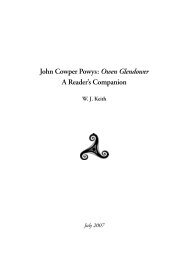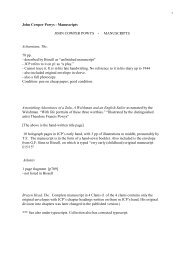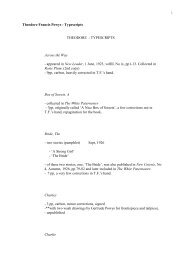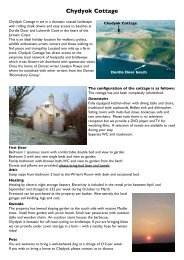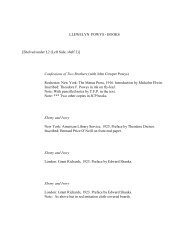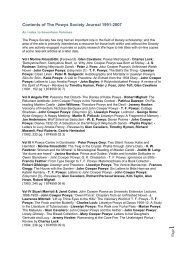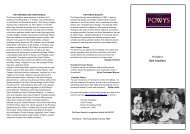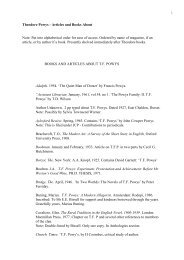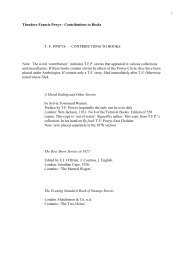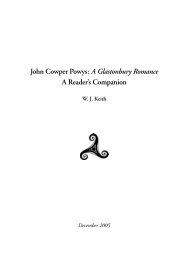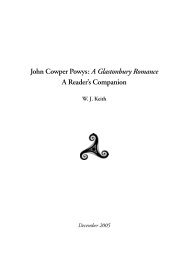J. C. Powys' Autobiography: A Reader's Companion - Site POWYS
J. C. Powys' Autobiography: A Reader's Companion - Site POWYS
J. C. Powys' Autobiography: A Reader's Companion - Site POWYS
Create successful ePaper yourself
Turn your PDF publications into a flip-book with our unique Google optimized e-Paper software.
42 <strong>Autobiography</strong><br />
phrase “we Neanderthal Powyses” (260),<br />
Jacquetta Hawkes, the distinguished<br />
archaeologist, claims that she was able to<br />
persuade JCP that his features really resembled<br />
those of the Beaker Folk (Humfrey, ed.,<br />
Recollections [249]).<br />
Nebuchadnezzar (34, 133) — King of Babylon, also<br />
known as Nabuchodonosor. His degradation,<br />
when he was forced to eat grass, is recorded in<br />
Daniel 4:32.<br />
“Neither for God nor for His enemies”<br />
(417) — From Dante’s Inferno (Canto 3, l.39), also<br />
quoted in Ducdame (127).<br />
Neo-Thomism (282), Neo-Thomists<br />
(417) — References to the revival of interest in<br />
Thomas Aquinas’s theology in the late nineteenth<br />
and early twentieth centuries.<br />
Nepenthe (297) — A drug supposed to drive away<br />
care, given by Helen to Menelaus and<br />
Telemachus in Homer’s Odyssey (Book 4),<br />
though Roland Mathias (90) argues that JCP’s<br />
fascination with the word derives from Edgar<br />
Allan Poe.<br />
Nereus (263) — The “Old Man of the Sea,” father<br />
of the Nereids or sea-nymphs. JCP gives a<br />
different list of the Nereids, derived from<br />
Hesiod’s Theogony, in Porius (835). Homer also<br />
mentions them, and JCP lists some in Homer and<br />
the Aether (227).<br />
Nero (401) — The notorious Roman Emperor from<br />
54 to 68, known for his cruelty and<br />
irresponsibility.<br />
“Never or always” (216) — A phrase borrowed<br />
from Goethe’s Wilhelm Meister. It became the<br />
last words of A Glastonbury Romance and also<br />
appears in After My Fashion (155), The Meaning of<br />
Culture (117), Dostoievsky (158), In Spite Of (304),<br />
and Diary 1930 (169).<br />
“never was but always to be blest” (470) — From<br />
Pope’s Essay on Man (I 96).<br />
Nevils (117) — This statement explains why<br />
Montacute is named Nevilton in Wood and<br />
Stone. Apparently, however, there is no evidence<br />
for the Nevils owning the fief in ancient times.<br />
new President (505) — F. D. Roosevelt (q.v.).<br />
Newman, Cardinal (270, 311, 359) — John Henry<br />
Newman (1801–1890), priest, poet, and prosewriter,<br />
whose conversion to Roman Catholicism<br />
in 1845 caused a great stir in Church of England<br />
circles. His Apologia Pro Vita Sua appeared in<br />
1864.<br />
Nietzsche (135, 139, 190, 271, 286, 313, 356, 367,<br />
376, 377, 386, 395, 403, 430, 431, 432, 476, 527, 546,<br />
565, 610, 631; cf. 409) — Friedrich Nietzsche<br />
(1814–1900), German philosopher, best known for<br />
Thus Spake Zarathustra (1882), his numerous<br />
other works including Ecce Homo (see 356). JCP<br />
devoted chapters to him in Visions and Revisions<br />
and The Pleasures of Literature. Nietzsche’s<br />
opinion on Maupassant mentioned by JCP (256),<br />
“a genuine Latin, of whom I am particularly<br />
fond”, in “Why am I so intelligent?” (Ecce Homo<br />
[Part 2, section 3]). So, “Nietzschean” (432, 565).<br />
Nietzsche, Frau Föster (398) — In fact, Frau<br />
Elisabeth Förster-Nietzsche, Friedrich’s sister,<br />
who did so much harm in attaching his ideas to<br />
proto-fascist principles. For an excellent article on<br />
JCP’s visit, see Elmar Schendel’s “Taking Tea with<br />
Nietzsche’s Sister.”<br />
Nimrod (65) — The “mighty hunter before the<br />
Lord” of Genesis 10:9. He appears in Dante’s<br />
Inferno (Canto 31, l.77). He had been called a<br />
giant by St. Augustine.<br />
nine mouths left to him (229) — His wife and the<br />
eight children still at home. Nelly had died (see<br />
“certain little girl”), Theodore had begun farming<br />
in Suffolk, and Littleton was at university.<br />
1917 was the worst year of my whole life (592 [but<br />
cf. 216]) — Jacqueline Peltier (“American” [59,<br />
n25]) demonstrates that 1917 is an error for 1916.<br />
nipping and eager air (395) — From Shakespeare’s<br />
Hamlet (I iv 2).<br />
“Non omnis mortuus est” (619) — Literally, “not<br />
everything is dead” (Latin), adapted from Horace,<br />
Odes (III 30). Also referred to (in English) in A<br />
Glastonbury Romance (1137) and partly quoted in<br />
The Art of Growing Old (213).<br />
normal schools (469) — In North America at this<br />
period, schools that provided preliminary training<br />
for teachers.<br />
Norna of the Fitful Head (66, 75, 231, 351) — A<br />
prophetess in Scott’s novel The Pirate. Her “fate”<br />
(66) refers to the fact that, after discovering that<br />
she had helped to imprison her own child, she<br />
renounced her title and all desire to interfere into<br />
other people’s lives.<br />
Northwold (37; cf. 134) — The village in Norfolk<br />
where JCP’s maternal grandfather was rector, and<br />
where JCP visited frequently when a child.<br />
Norton (346) — Norton-sub-Hamdon, a village to<br />
the west of Montacute.<br />
Norwich (103) — The county town of Norfolk.<br />
“not made with hands, eternal in the heavens”<br />
(237) — 2 Corinthians 5:1. Also quoted in part in<br />
Wood and Stone (11), The Pleasures of Literature<br />
(576), and Obstinate Cymric (92).<br />
Nothe, the (19) — A fortified promontory to the<br />
south of the Esplanade at Weymouth. It is<br />
mentioned in Wood and Stone (576) and in<br />
Weymouth Sands (25, 43).<br />
“Nothing is more unpleasant than to be<br />
obscurely hanged” (583) — Not identified in<br />
Voltaire, but JCP may be in error here. The



